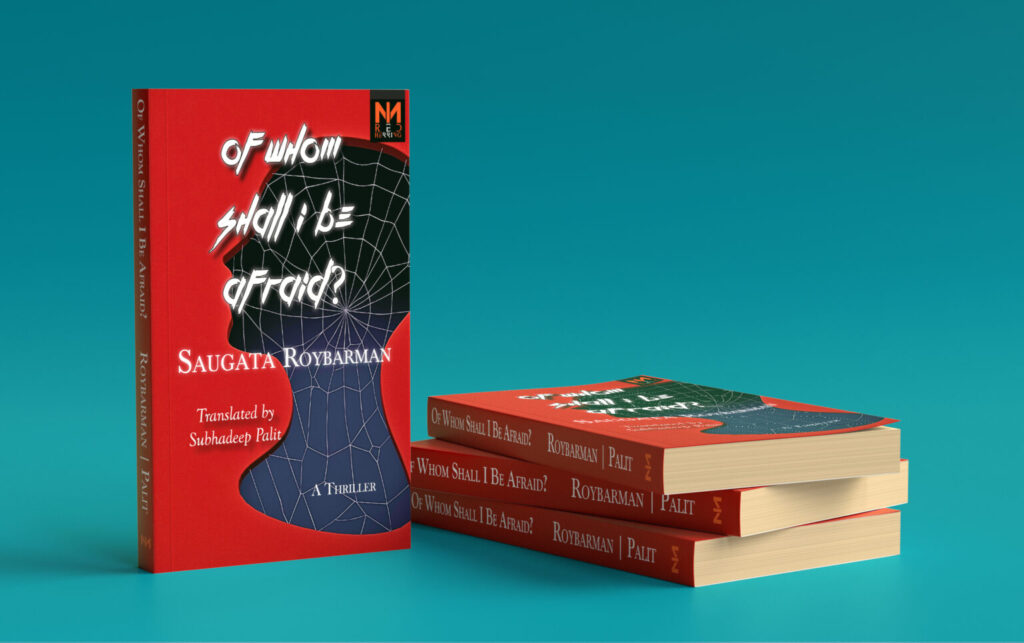A BOOK REVIEW BY DEBRAJ MOULICK
“Turning and turning in the widening gyre
The falcon cannot hear the falconer;
Things fall apart; the centre cannot hold;
Mere anarchy is loosed upon the world,
The blood-dimmed tide is loosed, and everywhere
The ceremony of innocence is drowned;
The best lack all conviction, while the worst
Are full of passionate intensity.”
(The Second Coming, W.B. Yeats)
One might wonder the context of quoting the famous lines from Yeats’ famous poem, The Second Coming as the opening statement of the review of ‘Of Whom Shall I be Afraid’. Let there be an end to this wandering thoughts, this novel involves blood-baths, falling apart of lives as well as things, sacrifice of innocence and most importantly the game between falcon and falconer; however, you need to dive into this adrenaline pumped thriller in order to decipher the falcon, falconer and most importantly the game.
Bhoi Chai Bhoi (2017) originally written in Bengali by Saugata Roybarman and translated into English as Of Whom Shall I be Afraid (2023) by Subhadeep Palit. It is a high pumping thriller set in the backdrop of City of Joy involving two main characters, Rishin and George. One is the killer while another one is the victim. Ironically the victim has hired the executioner to execute him so that he could feel the sense of fear, the intensity of emotions which can be experienced by a person nearing his doom. This is where the book is ahead of the curve and it steers way ahead than the regular crime whodunits published in the recent years. The novel depicts a fascinating plot, an array of striking characters and an appealing narrative technique.
Panic and the Plot
A guy without any thrill in his life hires a suave killer to exterminate him and while doing so they engage themselves in a wild chase of cat and mouse. The subplots trace the problematic relationship of the victim with two women characters. It also focuses on the origin story of the main players Rishin and George. The storyline dives into the shady side of the conurbation and the readers are going to have an exhilarating time while walking through the gory underworld of Kolkata, connection with communist past and the tryst with minorities of Anglo-Indian community in Kolkata as well as Bengal. The panic in the mind of the protagonists as well as antagonists drives the plot.
Charismatic Characters
Rishin is a genius heading an advertising agency and he is having everything by his side, money, a loving partner but he is problematic. He has lost the ability to feel anything. The author provides a backdrop of Rishin, his early days and his college days in Scottish Church College and his relationship with the love of his life, Mandira with whom he engages into passionate lovemaking. One moment he is a passionate man and the next moment he is the empty bullet shell, empty but exceedingly volatile. A classic case of bipolar disorder. Rishin is the one who invents the problem in the plot and gets enmeshed by the intensity of the whirlpool created by him.
Mandira, an eminent journalist has been etched as a confident modern woman who ends up being at the receiving end of the eccentricities of her husband, Rishin. She constantly tries to untie the knot of the complex situations but at times she is helpless but ends up being an important player in the dangerous game.
Payel is the mysterious woman who shares a history with both Rishin and George. She metamorphoses into a woman with a different identity, she links the protagonist and the antagonist in the most unexpected way.
George, a love child of a catholic priest makes a dashing mark in the narrative. He displays a super chiseled figure and an active mind, he is the most stylish and the most dangerous character in the novel, he doesn’t have the license to kill but he kills according to his own accord mostly in exchange of money. In an unethical way, George is the most ethical one.
Another character that deserves a mention, the high ranked Police officer, Sadananda Ray who heads the investigation of the missing man and a high voltage murder of an underworld don.
Narratives
The narrative technique remains one of the most striking features of the text. It goes backward in an episodic manner. The book is divided into three parts each begins with the quotes from the holy Bible. The Omnipotent narration provides an in-depth exploration of plots, the psychological development of characters, the connection with colonial past (Portuguese history and Bow Barracks), Communist revolution (Naxalbari), insinuation to classics of English Literature (T.S. Eliot’s The Wasteland, Shelly’s Promethus Unbound), the thrill of navigating through the bylanes of Kolkata and lastly the whole curiosity about the destiny of the characters makes this one a must read. With impeccable editing, striking cover design and a smooth book binding, this one deserves to be part of your book shelf.
Blurb
Stayin’ Alive. That’s what Rishin had always wanted to do. He did not want to spend his life like a coward. He wanted to live,to breathe and feel afraid. He wanted to taste fear. His quest
for fear dragged him to his own nemesis. He hired a killer to kill himself.
His life revolved around three axes – Mandira, Payel, and George. While Mandira was the interior of his Home, Payel was the call of the wild, the unknown. And George? He is the assassin Rishin appointed to kill himself. Will George honor his code and the contract?
The night is young. People are running. Some chasing, some being chased. What will happen at the break of dawn? Who will live and who will die?
Also, read Book Excerpt of “Of Whom Shall I Be Afraid” by Sougata Roybarman, Translated from The Bengali By Subhadeep Palit, published in The Antonym:
Follow The Antonym’s Facebook page and Instagram account for more content and exciting updates.





























0 Comments